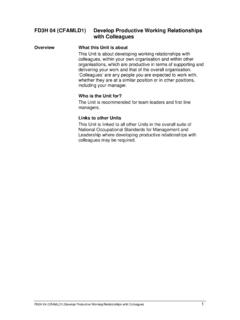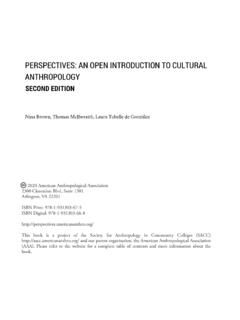Transcription of National Quali cations SPECIMEN ONLY - SQA
1 Total marks 30 Read the passages carefully and then attempt ALL questions, which are printed on a separate Reading for Understanding, Analysis and Evaluation TextDate Not applicableDuration 1 hour 30 minutes*SQ14H11* HNationalQuali cationsSPECIMEN ONLYPage twoThe following two passages focus on the importance of 1In the first passage Janice Turner, writing in The Times newspaper, considers the value of trees. Read the passage below and attempt the questions which the tree surgeon from the window, I felt I was witnessing a crime. One I d authorised, like a Mafia hit. The holm oak a dense, virulent, evergreen ball loomed over the garden like a storm cloud.
2 It had to be cut back. But as the chainsaw whined and branches tumbled, I wondered if I really had the m a resolute city-dweller, but trees seem ever more precious these days, a rebuke to built-in obsolescence, a steady point in a churning world. My pear and apple trees are remnants from when South London orchards ran all the way down to meet the sea. The walnut reaches out a mammoth limb from my neighbour s garden to mine like God s arm on the ceiling of the Sistine Chapel in are our living past, clocking up the years, ring by ring. Trees are calming like cathedrals, reassuring us that they will endure even though we will not.
3 No wonder the ancients believed they were gods; there are worse things to worship than a this week, reading how some protesters had been arrested trying to prevent ancient woodland being destroyed to make way for a three-mile link road to Hastings, I thought: yes, I d go to prison for a tree. Indeed, the protesters who are digging tunnels in the mud and standing before the diggers are not eco- warriors or hippies . Among them are young families, retired folk and ordinary dog-walkers. Local grandmothers , it was reported, came to swing in giant hammocks strung between the 400-year-old this is their last stand.
4 They can only slow the developers. By March the trees will be felled. Local people have fought for 20 years to save them, but they are on the wrong side of what the government is determined to market as progress, however short-term and dubious the economic benefits. The Chancellor of the Exchequer gave million of government money for this very road, which will fill up with extra traffic, as new roads do, and lead in time to a spanking new industrial estate, although Hastings town already has plenty of boarded-up premises from which to versus the trees. The government tells us that those who want to protect open countryside and woodland from being turned into endless Lego-brick estates are not conservationists, they are selfish, privileged people who, sitting comfortably in their own cheaply bought piles, have no care for struggling young couples who can t afford a family home.
5 Anyway, what s a bunch of trees?But people with no respect for trees show a special kind of arrogance: they think they re bigger than history. I d argue that cutting down an ancient oak is worse than killing most types of animal. Certainly the more numerous species such as dogs, cows, monkeys or cats. A chainsaw slicing into a 300-year-old trunk is more brutal and grotesque than hunting 100 foxes. Chopping down a fine old tree is more like shooting an elephant or harpooning a whale: the aching poignancy of an enormous creature whose size and strength nonetheless cannot save it. Except even the mightiest mammal can be bred to maturity in a few years.
6 Not so a it is astonishing, given how much people love them planting them to mark special moments or honour dead loved ones, measuring their lives by their seasonal changes that officialdom loathes trees. Insurance companies fretting about subsidence would rather you took them all down just in case. Councils detest them, employing municipal butchers to hack away at whole groves. Embarrassed stumps with a couple of twigs are all that threeIt s a wonder any tree survives a health and safety audit. One City Council tried to remove a whole row of horsechestnuts because conkers fell on cars and children might slip on leaves.
7 Our local primary school cut down a fine tree beneath which generations of children had played, because the new head deemed its twigs and leaves too messy. A posh gardener once suggested we cut down most of our trees and start again with fresh, more groovy varieties. This misunderstood the very point: trees are the antithesis of fickle fashion. But some crass homeowners can t bear the fluff-balls from plane trees messing up their hall carpet or the lime sap puking down on their shiny car bonnets. Neater to reach for the axe. Maybe garden centres should start selling plastic ones: say goodbye to autumnal Burma, I learnt that its teak forests were flogged off to China by the generals, who were desperate for quick cash, like a beautiful girl being forced to sell her hair.
8 Iceland is barren because Vikings cut them all down in a year and Peru is logging away its country s trees will tumble to make way for the machines of progress. But for how much economic growth is it worth mowing down a wood? Trees are beyond priceless: they are our history inscribed in the natural world. Which rich men, planting beautiful orchards to their own glorious memory, have always from an article in The Times newspaper, January fourPassage 2In the second passage below, the science writer Colin Tudge gives his own views on the passage and attempt the question which follows. While reading, you may wish to make notes on the main ideas and/or highlight key points in the passage.
9 In New Zealand a few years ago I experienced more powerfully than ever the sheer gravitas of trees: in the presence of the world s largest kauri. Kauris are conifers, the biggest of their family. The great trunk of the kauri rises like a lighthouse out of the gloom: fifteen metres in circumference it would touch all four walls in an average living room and straight up, leafless, for twenty metres or so. And then on its great horizontal boughs rests a virtual park, a floating island with an entire ecosystem of ferns and flowers. Kauris are about 2000 years old. For the first 1400 years of the kauri s life, moas strutted their stuff around its base.
10 Moas included the world s tallest-ever birds, like giant emus, which were preyed upon by commensurately huge but short-winged eagles. The moas and their attendant eagles are now long gone. The kauri lives remaining kauri forest has been horribly reduced these past two hundred years, but the way modern New Zealanders look after the trees that are left to them is a model for all the world. Rare trees are no longer felled but existing planks are prized and meticulously re-cycled. Meanwhile, you can follow slatted wooden paths among the vast conifers. That s conservation; that s intelligent ecotourism.















